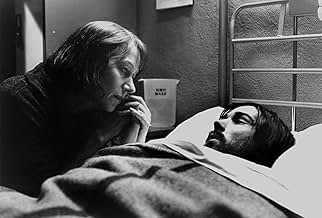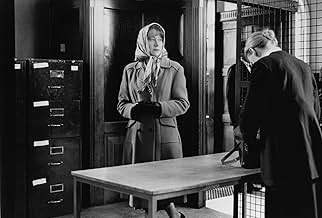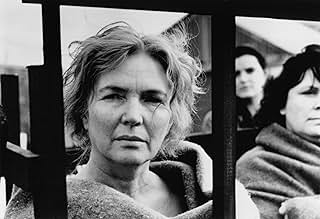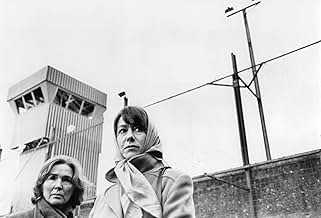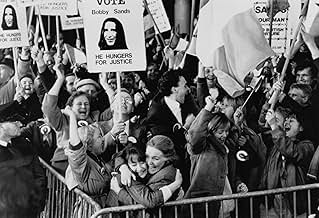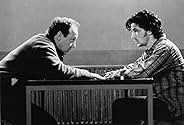Füge eine Handlung in deiner Sprache hinzuThe 1981 hunger strike in an Irish prison, in which I.R.A. prisoner Bobby Sands led a protest against their treatment as criminals rather than as prisoners of war. It focuses on the mothers ... Alles lesenThe 1981 hunger strike in an Irish prison, in which I.R.A. prisoner Bobby Sands led a protest against their treatment as criminals rather than as prisoners of war. It focuses on the mothers of two of the strikers, and their struggle.The 1981 hunger strike in an Irish prison, in which I.R.A. prisoner Bobby Sands led a protest against their treatment as criminals rather than as prisoners of war. It focuses on the mothers of two of the strikers, and their struggle.
- Regie
- Drehbuch
- Hauptbesetzung
- Auszeichnungen
- 4 Gewinne & 1 Nominierung insgesamt
Empfohlene Bewertungen
I personally think this film is quite thought-provoking and the acting is convincing. Helen Mirren, as Kathleen Quigley, who has not been aware that her son Gerard (Aidan Gillen) is an IRA soldier, is determined to help her son to survive, while Fionnula Flanagan (Annie Higgins) is terrific as a nationalist mother who is right behind her son's beliefs but eventually witnesses his death, only after losing her other son, who is shot dead by the British Troops.
Some might say many of us are IRA sympathisers and that they are nothing but a bunch of killers, that they are nothing but a bunch of terrorists. However, as one reviewer put, 'there would be no IRA if there was no British oppression'.
As a film this is an incredibly moving portrait of the horror, sacrifice and absurdity of war. The cast is outstanding; Helen Mirren is simply stunning, Fionnula Flanagan gives a powerful performance, Aidan Gillen is stirring as Helen Mirren's son and Bobby Sands' cell mate and finally John Lynch portrays the role of Bobby Sands quite fairly. The writers and director Terry George and Jim Sheridan have done an outstanding job writing and filming a story that transcends conflict and speaks to humanity we all share. While it shows the injustice of the position from which many of the North Ireland Catholics faced (and therein lies its political slant) the title firmly roots this film as so much more. I highly recommend this film for its historical authenticity and the brilliant performance by Helen Mirren.
Interestingly, Helen Mirren also starred in "Cal", another movie about the "Troubles" of Northern Ireland, playing a Protestant widow who falls in love with a Catholic man. In both movies, Mirren's character endures the unthinkable - watching the people she loves best being torn by sectarian violence. Yet in "Cal," Mirren's character is more passive, having things "happen" to her. In "Some Mother's Son", Mirren and Flanagan take action, their passion for their children stirring them to activism, right or wrong.
The story portrayed in the film echoes the 2nd book in particular so closely at times that I expected to see the three men credited (They were actually H Block prisoners who took part in the protest and hunger strikes themselves). Of course from that perspective it is understandable that some would claim that it tends towards bias or discriminates towards a one sided view on a very complex issue.
The reality of the film is that whilst the majority of the characters save Bobby Sands are fictional, many of them, with just a little background reading are recognisable as real life people such as Fr Denis Faul, Bik McFarlane, "The Mounain Climber" and a composite of Gerry Adams/Danny Morrison.
It is a charge fairly frequently levelled at Jim Sheridan that he embellishes or takes liberty with factual real events such as in Michael Collins or In America - However, that is usually levelled by someone with an obvious axe to grind or viewing from an opposite perspective. So whilst it is desirable for a good film to document even real facts in an understandable way in less than two hours it is also nice to be entertained and have your curiosity aroused so that you can read further on the subject if you so desire. Some Mothers Son is probably one of these types of movies where the viewer's experience and insight is best enhanced by prior knowledge or at least some background of the events which out of necessity the film is compelled to synopsise and simplify some times.
The facts surrounding this turbulent period in Northern Irish history is that after a prolonged "dirty protest" to be recognised as prisoners of war instead of criminals or terrorists, in 1981 the republican H-Block prison inmates embarked on a hunger strike which by the time it had ended some 6 months later had seen ten of them die but more significantly for the republican movement in NI had seen a wider world focus on them and also had seen a new dawn towards the use of the ballot box instead of the Armalite assault rifle as a means to an end by Sin Fein/IRA which 25 years later is culminating in an electorally strong Sinn Fein and a decommissioned largely stood down IRA.
All in all therefore, as a pen picture which goes some way towards giving one a basic insight into the Northern Ireland Hunger strike of 1981 it does a good job which is greatly helped by very good performances by Helen Mirren, Fionnula O Flanigan Gerald McSorley and John Lynch in particular. Oh and if the soundtrack sounds vaguely familiar it may be because it is by Bill Whelan of Riverdance fame.
Convicted of taking part in an attack on British forces as part of an IRA Active Service Unit, her son quickly finds himself the cell-mate of soon-to-be-IRA-icon/martyr, Bobby Sands. Although the film does not really explore the personality of this seminal figure (for ex: that he was a poet), it does convey the gravity of the situation he was thrust in as well as the huge impact the hunger strike had on the Northern Irish, indeed people around the world.
But more so, this film is about the suffering that the women in these situations, particularly the mothers (hence the title) must endure. They have no choice in the tragedy that forces itself on their lives, yet they must find ways to overcome and affect what positive change they can.
Some say there is not enough "action" in the film. It is not an "action" movie. There are plenty of Dolph Lundgren vehicles out there if that is all you want. This film is about how episodes of moving history effects everyday people's lives.
Wusstest du schon
- WissenswertesTheatrical movie debut of Tom Hollander (Farnsworth).
- PatzerThe film is clearly set in a border seaside fishing village in Ireland. However, Kathleen is clearly seen voting in the Fermanagh-South Tyrone by-election: a completely land-locked constituency.
- Zitate
Kathleen Quigley: What are you doing here?
Alice Quigley: I resigned.
Kathleen Quigley: What?
Alice Quigley: I can't work there anymore.
Kathleen Quigley: Why?
Alice Quigley: Nobody trusts me!
Kathleen Quigley: Well did- did someone say something?
Alice Quigley: No... I just know.
Kathleen Quigley: Oh, for God's sake! Alice!
Alice Quigley: It's a bloody bank, Mum! The IRA have robbed it four times, why should they trust me?
Kathleen Quigley: Gerard didn't rob it!
Alice Quigley: How do you know?
Kathleen Quigley: ...Where will you work?
Alice Quigley: I can't stay here anymore. I hate this country.
- VerbindungenFeatured in The Movie Show: Folge vom 14. Mai 1997 (1997)
- SoundtracksStar of Desire
Composed by Scott Wooldridge & Brian Wooldridge
Performed by The Wooldridge Bros.
Courtesy of Windswept Pacific Entertainment and Don't Records
Top-Auswahl
Details
- Erscheinungsdatum
- Herkunftsländer
- Sprachen
- Auch bekannt als
- Teufelskreis der Gewalt
- Drehorte
- Produktionsfirmen
- Weitere beteiligte Unternehmen bei IMDbPro anzeigen
Box Office
- Bruttoertrag in den USA und Kanada
- 671.437 $
- Eröffnungswochenende in den USA und in Kanada
- 88.515 $
- 29. Dez. 1996
- Weltweiter Bruttoertrag
- 671.437 $
- Laufzeit1 Stunde 52 Minuten
- Farbe
- Sound-Mix
- Seitenverhältnis
- 1.85 : 1
Zu dieser Seite beitragen



